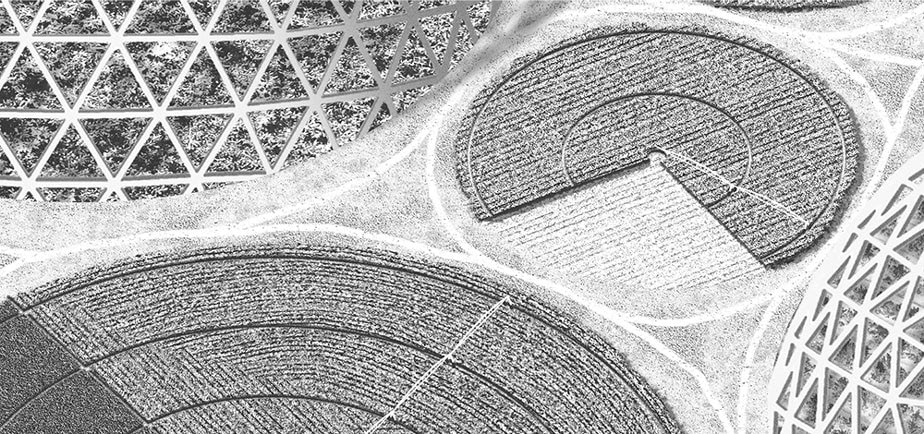Dutch illustrator Max Philippi has invented an online world that may help to save the real one. State of Scarcity explores interesting ideas and inventions, in part inspired by Buckminster Fuller, which Philippi hopes will serve as models for real life applications.
Opening the interactive application we enter Wrighton, a fictitious town set in a not-so-distant future, and based on concepts like reuse, recycling and de-cultivation. In this society people do everything "right" in a social and ecological sense by combining old and new nature. Philippi explains how:
“At its core, State of Scarcity is about balancing humanity with everything else on the planet. According to the WWF Living Planet Report of 2012, humanity as a whole would need half an additional earth in order to sustain its current lifestyle. Even worse, if everyone lived as a Dutchman, like me, we would need three and a half earths in total.
"So the present-day overburdening and destruction of ecosystems is happening, and it is a terrible thing. Therefore, I went on a quest to find the Big Bads responsible for this situation, but it proved impossible to accuse people without hypocrisy. I found that I myself, as an inhabitant of a Western nation, was often just as guilty as the villains.
"To avoid this pitfall I decided to depict a fictitious society, in order to focus on our possibilities and opportunities, not on our faults and errors. Also, super smart inventor Buckminster Fuller stated that when a problem in human behavior needs fixing, one should not try to change the humans themselves, but their living environment. Therefore, in my digital application I paint a state of the future that is superior technology-wise, super-social economy-wise, and dead capitalism-wise.
"Inspirations for this so-called State of Scarcity include: the aforementioned Buckminster Fuller was a genius that saw it as his mission in life to create a comfortable world for people to live in, but using as few resources as possible in the process. His motto “doing more with less” resonates in all his ideas, which range from almost pure science fiction, like flying dirigible cities and encasing part of New York in a giant geodesic dome in order to control the climate, to more down-to-earth projects, like efficient cars and modular housing. The Venus Project is a group that aspires to rebuild the world into a utopia where boring labour is unnecessary, money does not exist, and humanity approaches the environment in a balanced and responsible way. They want to build entirely new cities systems in a nice futuristic white tone, to would make such a future possible. The Spanish village of Mondragón has developed a socio-economic system that works very well. The village as whole is a conglomerate of a multitude of collaborating super-social cooperatives. The entire workforce of these cooperatives is partly owner, and decisions are made democratically, resulting in a very solidarity-oriented system in which everyone is equal.
"One of the main concepts of the State of Scarcity is de-cultivation. Because the countless natural processes and systems running to keep the planet alive function best without human interference, it would be best if humankind would give the planet back to nature. Humanity needs nature, but nature does not need humanity. Therefore, in the new world, the human population is retreating to designated colonies. Hazards left behind by the old world are stripped of recyclables and rendered harmless. Then, in the de-cultivated territories nature is given free reign again; and humanity mostly stays inside their colonies.
"The application takes place in the Greater Fullerport Area, one of these colonies. Whereas in the decultivated zones nature remains undisturbed, here it is tightly controlled. Farms in geometric shapes yield the maximal amount of crops. Meat is grown in vats, as animal husbandry is too inefficient. Wood is harvested from vast plantations. Cities are built in predefined hexagonal shapes in order to conserve space, with wood (completely renewable) and aluminium (completely recyclable) playing major roles in construction.
" So the new earth is divided between the condensed human colonies and the expansive wilderness. These two worlds go hand in hand, with the ‘old’ nature sustaining the planet, and the ‘new’ nature being developed to serve humanity best."
Resigning from the old world and building a new one: it’s only fiction… so far!

Share your thoughts and join the technology debate!
Be the first to comment